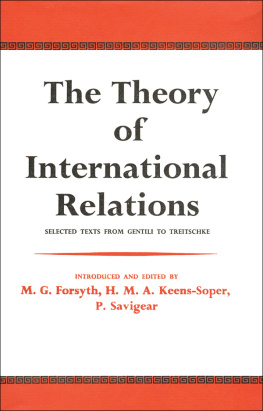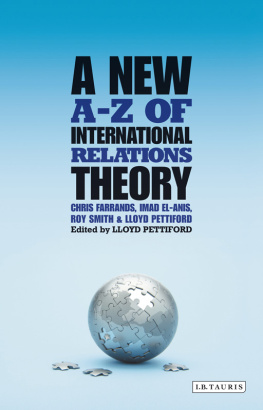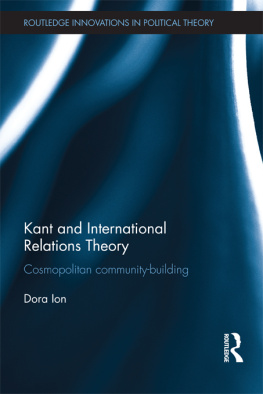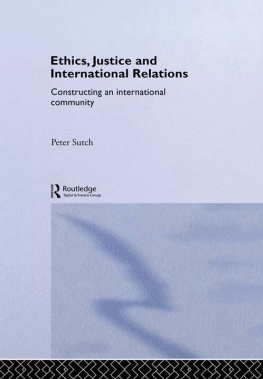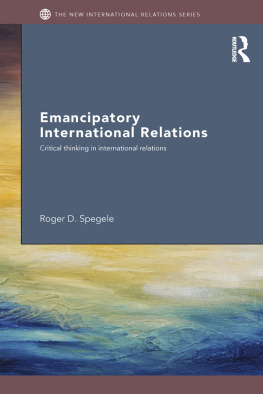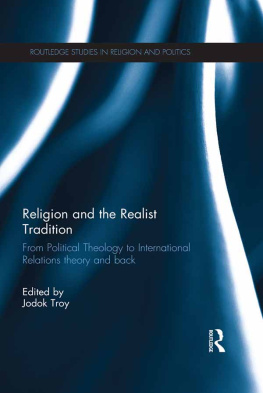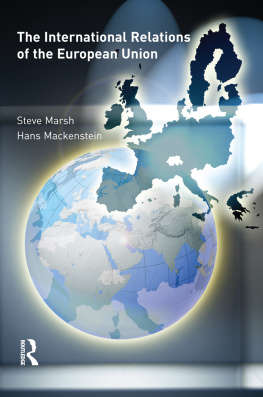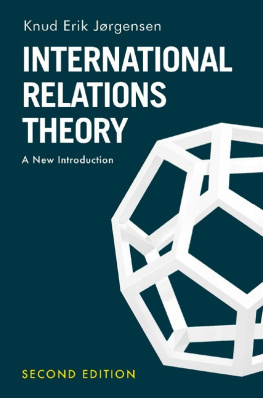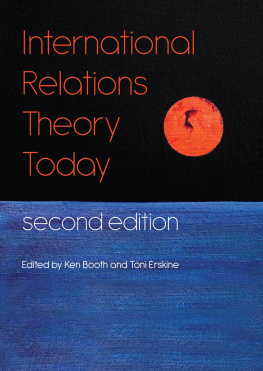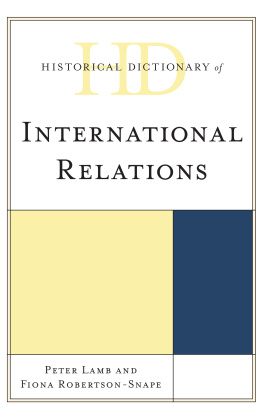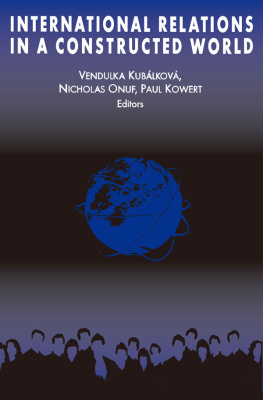First published 1970 by Transaction Publishers
Published 2017 by Routledge
2 Park Square, Milton Park, Abingdon, Oxon OX14 4RN
711 Third Avenue, New York, NY 10017, USA
Routledge is an imprint of the Taylor & Francis Group, an informa business
Copyright 1970 George Allen and Unwin Ltd.
All rights reserved. No part of this book may be reprinted or reproduced or utilised in any form or by any electronic, mechanical, or other means, now known or hereafter invented, including photocopying and recording, or in any information storage or retrieval system, without permission in writing from the publishers.
Notice:
Product or corporate names may be trademarks or registered trademarks, and are used only for identification and explanation without intent to infringe.
Library of Congress Catalog Number: 2008027960
Library of Congress Cataloging-in-Publication Data
The theory of international relations : selected texts from Gentili to Treitschke / M.G. Forsyth, H.M.A. Keens-Soper, and P. Savigear, editors.
p. cm.
Originally published: London : Allen & Unwin, 1970.
Includes bibliographical references and index.
ISBN 978-0-202-36300-4 (alk. paper)
1. International relations--Sources. I. Forsyth, Murray Greensmith. II. Keens-Soper, H. M. A. III. Savigear, Peter.
JZ63.T44 1970
327.101--dc22
2008027960
ISBN 13: 978-0-202-36300-4 (pbk)
This volume contains selections from nine authors, arranged in chronological sequence from Alberico Gentili, writing in 1598, to Heinrich von Treitschke, lecturing in Berlin at the end of the nineteenth century. Some of the selections are complete in themselves, others have been extracted from larger works. All are concerned with the nature of international politics. Why has this anthology been made, and in what sense does it contribute towards the theory of international relations? These are the questions which this introduction will try to answer.
There can be little doubt that the great writers of the past are at present neglected by students of international relations. It is significant that Gentzs essay on the balance of power has not appeared in English since 1806, while Rousseaus writings on international politics have never been fully translated at all. The American series called The Classics of International Law (New York: Oceana Publications, Inc.), to which the editors of this volume are heavily indebted, have provided a magnificent service in republishing and translating several major texts. The size and complexity of many of these texts can, however, act as a deterrent to the inexperienced.
There is then a prima facie case for presenting in a manageable form the writings of the classic authors; such a case can only be made convincing if the relevance of these writings is also demonstrated. Do they genuinely deepen our understanding, or are they merely curiosities, part of the pre-history of a subject which is only now entering into its truly scientific phase? This is not the place to examine the merits of the behavioural or systems approach to international relations. Suffice it to say that the editors of this volume believe that the most fruitful theoretical approach to this particular subject does not lie in the construction of all-embracing systems, nor in the deduction of scientific laws from the empirical observation of facts. To theorize about international relations is, in their opinion, to reflect philosophically and historically about this area of human activity.
It is not intended at this point to give a full expos of the philosophical and historical methods of study; such a task would require a book of its own. A brief definition may, however, be suggested. By philosophical reflection is meant the identification and clarification of the universal features, or concepts, implicit in experience. Experience for the philosopher is not a set of separate facts to be weighed and measured in order to reveal regularities or laws. Nor is it a chaos which has to be reduced to order by heuristic constructions which exist solely in the mind of the observer. Experience for the philosopher is essentially thought, a rational, self-critical activity. The philosophers task is to re-think experience, and to elicit the basic, universal assumptions which are contained within it. Such a task is, needless to say, enormously difficult. It is linked intimately to the historians task. The emphasis of the two subjects is different - the philosopher strives to distinguish the universal in experience, while the historian strives to identify experience within its particular temporal context-but the two activities are complementary, not mutually exclusive, and they share a common notion of experience. Without accurately identifying experience in an historical sense, philosophy can take place but be grossly misleading; without philosophical questioning, historical research can take place but be merely trivial. It is interesting that it was Kant, seemingly the purest of philosophers, who stressed that the philosophical mind must as such be thoroughly versed in history (see ).
If it is accepted that theorizing about international relations takes the form of a philosophical-cum-historical investigation of the type sketched above, then the selections included in this volume are not peripheral, but central to it. Indeed, in studying them, the philosophical and historical components of theorizing are very nearly in equilibrium. On the one hand the selections consist of thought at a fairly high level of abstraction, which is the form of experience most congenial to philosophy; on the other hand they consist of thought most definitely in the past, and this is the experience relevant to historians.
Having examined very briefly the methodological starting-point, a further question remains to be answered. Why these particular texts? Why Gentili to Treitschke? Why not Thucydides to Lenin? And why have Pufendorf and Saint Simon been left out, while Cobden and Vattel are included?
Let it be said immediately that the editors do not consider this particular selection to be definitive. It is intended as a preliminary tour dhorizon, a set of stepping-stones to further study. A vast amount of exploration requires to be done in this field, and undoubtedly new perspectives will be developed and other writers emerge into prominence as it progresses. In starting with this particular selection the editors had three main considerations in mind.
The first was that the writers chosen spanned a vital period - and area - in the development of international relations. It was in Europe between the sixteenth and nineteenth centuries that many of the underlying features of modern international society were developed. Perhaps the main developments were the emergence of interstate relationships as the key feature of international politics and the realization that these new relationships had their own specific rules and imperatives. The writings of the period reflect these developments in two ways. On the one hand they show a negative process, a desire to strip away the old, mediaeval, and primarily religious rules for international behaviour. On the other hand they attempt to develop new secular concepts to keep war within bounds - for example, the law of nature, international law, the balance of power, the league of nations, and the policy of non-intervention. It is primarily in order to illustrate these two themes that the writings which follow have been selected. They do not form a smooth, unilinear progression; each writer contributes his own distinctive viewpoint.

